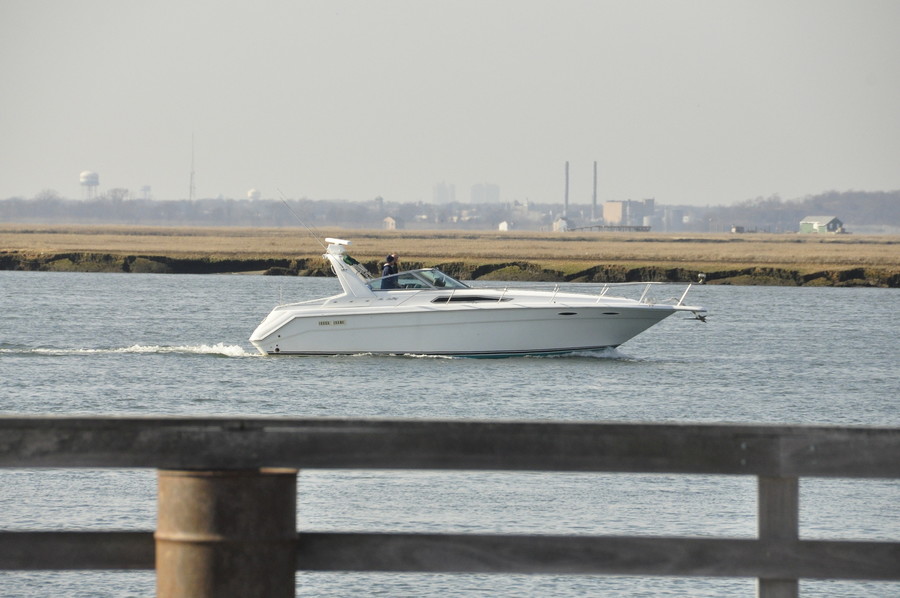Safe boating course required before running a motorboat
With summer right around the corner and temperatures subsequently rising Long Islanders will begin flocking to the water to relax and cool down. Long Island waterways will be populated by both motor and sailboats well through August. While lying back on a boat and enjoying the tranquility of the waters may be how hundreds of Long Islanders choose to spend their summer, safety should be every boater’s primary concern.
New York State now requires all individuals born after May 1 1996 to complete an approved boater education course before operating a motorboat. The eight-hour course is offered by the U.S. Coast Guard Auxiliary or the U.S. Power Squadron and is available to all individuals over 10 years of age at the Oceanside American Legion. Everything from the correct terminology to what to do in case of emergency is covered. However it’s unlikely that most people out on the water this summer will have taken this course, but there are still several safety tips all boaters should follow.
Operating a boat under the influence is illegal, just as it is illegal to operate a car while using drugs or alcohol. Brett Wegner, the vice president and senior technician for Reed Channel Marine in Oceanside adamantly stressed the dangers of alcohol on the water, “People associate boats with drinking but it get dangerous especially in the summer. Being out in the sun all day amplifies the effects of alcohol and things can get out of hand very quickly.”
The legal limit for a boating while intoxicated (B.W.I.) is the same for any other vehicle in New York State, .08 percent blood alcohol content. Hempstead’s Bay Constables are given breathalyzers and will be patrolling the waters throughout the summer.
In fact, Town of Hempstead Supervisor Anthony Santino held a press conference on May 23, to announce that the Bay Constables will be increasing BWI patrols this summer. The United States Coast Guard asserts that operating a boat under the influence may be even more dangerous than driving a car while drunk. The motion of the water, vibration of the engine, and constant exposure to the sun and wind all amplify the effects of alcohol.
According to the “New York Safe Boating Textbook” over 60 percent of boating fatalities in New York from 2005-2013 was the result of drowning. That number would be much lower would everyone follow two simple rules: stay sober and wear a life vest.
All passengers younger than thirteen are required by law to wear life jackets, but all passengers regardless of age should have one on. Although heading out with nothing but life jackets could end up leaving you high and dry. Wegner emphasized the importance of bringing more than just the bare minimum when preparing for the worst, “Besides life jackets, fire extinguishers and flares need to be on board, you pray you never need them but if you do they can save your life.”
At the press conference after imploring residents to stay sober when boating Santino recounted several safe boating tips shared with him by the Hempstead Bay Constables in honor of Safe Boating Week. Apart from taking the safety course they offer and wearing life vests they also recommend bringing a high frequency radio, flares, and an air horn to sound in case of an emergency. He also suggested having a “float plan,” by leaving a friend or family member who stayed on shore with a list including the planned route, anticipated time of return, and all passengers emergency services will know where and who to look for should the worst occur.
David Johnson spends his summers as the head sailing instructor at Wet Pants Sailing Association in Sayville. After spending much of his adult life working on the water he shared some other ways to stay safe out there that may have escaped the amateur boater. “Most people will jump on the boat in flip flops or barefoot but closed toe shoes are important, there’s a lot of things you could stub your toe or cut your foot on… Also having an anchor on board is almost as important as having life jackets, if you can’t anchor yourself any trouble or bad weather you run into could be a disaster.”
Most boaters this summer won’t encounter a situation even remotely resembling a disaster, but the most important part of any day out on the water is making it back to shore safely. By avoiding alcohol and being prepared residents will be able to fully enjoy the water.

 54.0°,
Fog/Mist
54.0°,
Fog/Mist 




